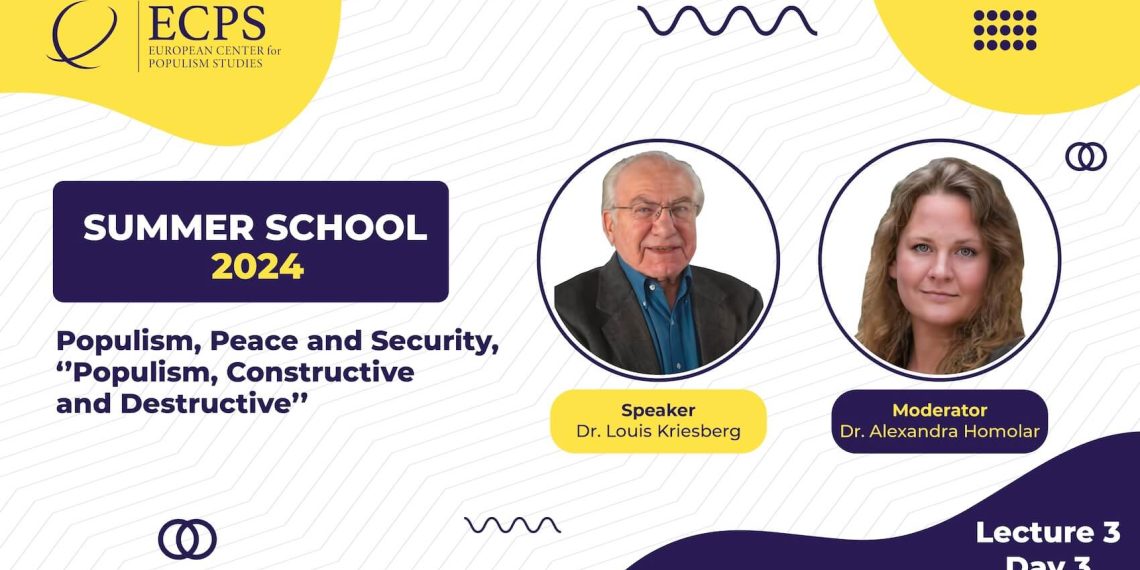Lecturer: Dr. Louis Kreisberg (Professor Emeritus at Syracuse University).
Moderator: Dr. Alexandra Homolar (Professor at the University of Warwick).
Dr. Louis Kriesberg is the Maxwell Professor Emeritus of Social Conflict Studies and Professor Emeritus of Sociology at Syracuse University. He has published widely on diverse areas of sociology and social conflicts, including the US-Soviet Cold War, Israeli-Palestinian-Arab relations, non- governmental organizations, and social movements. His recent work focuses on constructive ways of fighting, conflict transformation, and conflict resolution methods. Kriesberg has been highly active in regional, national, and international associations of sociology, conflict resolution, and international peace, for which he has received numerous awards. He was also the founding director of the Program on the Analysis and Resolution of Conflicts (PARC) at Syracuse University. He received his PhD in Sociology at the University of Chicago in 1953.
Populism is variously defined. For the purposes of this analysis, it refers to non-governmental people taking direct actions trying to change the conduct of some other resistant group. They are in conflict. In all human societies there are procedures to pursue and settle many such conflicts – the procedures are embodied in legal and political institutions. However, members of one or more contending parties often choose to take actions which are deemed populist. Often, the actions are intended to influence the conduct of members of established institutions. In this presentation, Professor Kriesberg examines the actions of people engaged in conflicts resorting to populist conduct. He discusses cases in the United States, in European states, and in other countries. In accord with work in the field of conflict resolution, he assesses their degree of being constructive or destructive. This is based on his many years of research and publications on this matter. Constructiveness varies in the nature of the inducements employed in a conflict, persuasion, promised benefit, and coercion. Usually all are employed in varying degree over time. Persuasion varies in different degrees of presumed effectiveness. Promised benefits relate to the terms of settlement being sought. Coercion varies in severity and therefore destructiveness, in varying degrees of violence and denial of benefits. Constructiveness also varies by the conception of each side has of itself and of its antagonists. Finally, constructiveness varies with the degree of differences each side has about the terms of a conflict settlement. In addition to assessing varying degrees of constructiveness, I will discuss how conflict destructivity can be reduced.
Moderator Dr. Alexandra Homolar is Professor of International Security at the University of Warwick. Homolar has taught and researched at universities in Germany, the US, and the UK. She currently holds a Leverhulme Research Fellowship for her project ‘Populist FantasylandLink opens in a new window‘ (RF-2021-527/7), and from 2013-2017 she was the Principal Investigator of the ESRC Future Research Leaders project ‘Enemy Addiction‘ (ES/K008684/1). At Warwick, Homolar is the academic lead of Speaking International Security at Warwick (SISAW) and the co-lead of the interdisciplinary Research in Global Governance Network (RiGG NetLink opens in a new window) as well as the organizer of the Annual Masterclass in CSS/IR. She served as Director of Research Degrees and on the PAIS Senior Management Team in 2018-2020. Homolar received her Diplom [BA Hons., MA] in Political Science, Law, History, and Empirical Research Methods as well her Dr. phil [PhD] from J.W. Goethe University Frankfurt.


